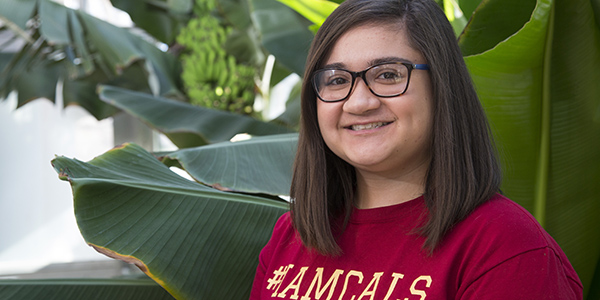
Creating cultural connections
Story by Tracy Schlater
Images by Christopher Gannon
Growing up, Megan Kemp just wanted to fit in with her peers in Durango, Iowa. At Iowa State University the junior in agronomy and global resource systems, says she found a place where she feels comfortable embracing and celebrating her differences.
“My mom is Filipino,” says Kemp. “She and my dad met as pen pals while he was serving in the military. He went to visit her in the Philippines, and that’s where they fell in love. It’s honestly the stuff movies are made of.”
Kemp’s extended family are involved in dairy and beef operations in northeastern Iowa. While she lived on a dairy farm, she didn’t do chores.
“My mom’s heritage instilled very traditional ideals about gender roles,” says Kemp. “So I spent more time in the kitchen.”
As a high school student, Kemp participated in the World Food Prize Iowa Youth Institute. She was selected for the Global Youth Institute. She received a $500 scholarship to the College of Agriculture and Life Sciences for her participation. Her plan was to study biology. Given her passion and interest in world hunger, her adviser encouraged her to consider agronomy.
“The day after I switched majors, I walked into Agronomy Hall and immediately Stephanie (Zumbach) and Dr. (Mary) Wiedenhoeft recognized me,” says Kemp. “I knew I’d found the right place.”
At the urging of a fellow student, Kemp attended a Minorities in Agriculture and Natural Resources and Related Sciences (MANRRS) meeting. Kemp had expressed interest in various other clubs on campus, but this one clicked. For the first time, she felt connected to her Filipino culture.
“It allowed me the freedom to experience my own identity,” says Kemp. “I loved growing up in small-town Iowa, but it wasn’t very ethnically diverse, and back then I didn’t realize how much of a difference that made in how I viewed myself.”
Kemp immersed herself in the MANRRS group. She started attending regular meetings and attended the national MANRRS conference. She was elected vice president and later took over as president, serving as the link between the local chapter and the organization’s national of cers.
In the fall of 2016, the College of Agriculture and Life Sciences made diversity and inclusion a higher priority after getting feedback from minority students. At that time, the college decided to develop a student-led group to address cultural competency.
The Leaders Enhancing Agriculture, Diversity, Inclusion and Trust (LEAD IT) Collective is committed to building strong leaders and community partners who not only acknowledge the values of diversity, multiculturalism and inclusion, but also recognize the importance of developing intercultural competency through actively engaging academics, multicultural programs and social justice initiatives.
Establishing herself as a leader in MANRRS meant her name rose to the top of the list as the college looked for students to join.
“It has been my pleasure to watch Megan grow and mature as a strong leader and student,” says Theressa Cooper, assistant dean for diversity of the College of Agriculture and Life Sciences. “I have watched Megan grow more self-assured, culturally competent and re ective of the world around her. Megan continuously demonstrates her conviction to exercise determination, diligence and excellence in all things; she is a great model of a young leader.”
“It’s made me a better global citizen.”
The LEAD IT Collective talks about bias, privilege, inclusivity and other multicultural issues in orientation classes, faculty trainings and student events across the college. Members of the collective attended the National Conference on Race and Ethnicity in May and hope to present at next year’s Iowa State Conference on Race and Ethnicity.
The experience in LEAD IT has had a deep impact on Kemp personally and as she looks forward to establishing her professional career.
“It’s made me a better global citizen,” says Kemp. “Personally, I’m learning to speak Tagalog, so I can talk to my grandmother and learn more about my culture.”
It’s changed the lens through which she views the world, including the agronomic principles she’s learning. Cultural issues and concerns are a key element to cropping systems across the globe.
“Always inquisitive, Megan strives to understand different cultures rather than judge them,” says Russ Mullen, retired agronomy professor and Megan’s former adviser. “She has an innate desire to help others and sees the good in people and their potential.”
Kemp will put those skills to use during an internship with the Center for Sustainable Rural Livelihoods in Uganda over the summer studying mixed cropping systems and how culture impacts agriculture.



